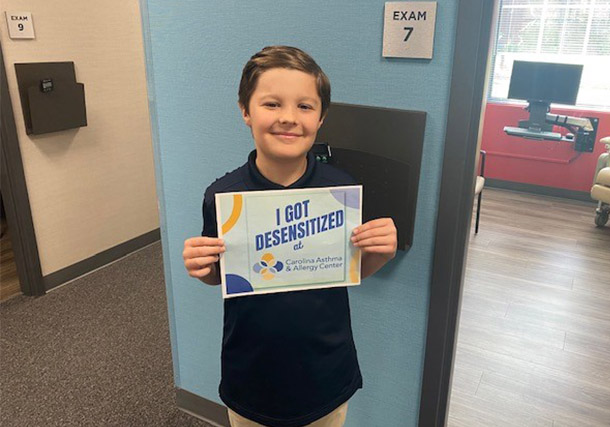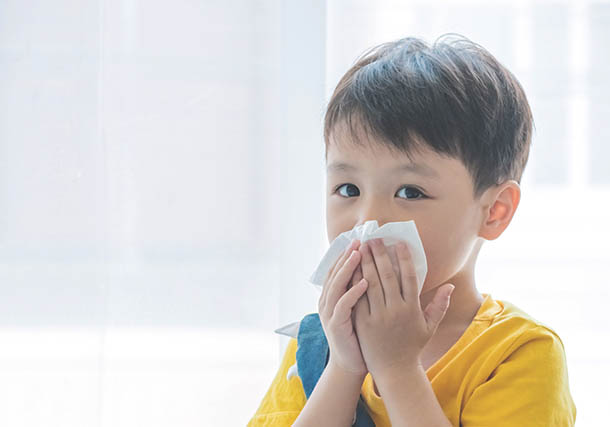
Pediatric Allergy Treatment in Charlotte
Pediatric allergies are often dismissed as “no big deal.” Yet, allergies in children cause about two million missed school days every year.
Pediatric allergies can range in severity, depending on the child and the allergen. Some allergies are life-threatening, whereas mild allergies may go away with time. However, nearly all allergies reduce your child’s quality of life. Whether your child is bothered by hay fever every year or allergies make his/her asthma symptoms worse, you should never let allergies go untreated.
At the Carolina Asthma & Allergy Center, we strongly encourage early identification of childhood allergies. We believe getting a diagnosis and care plan will boost your kid’s well-being and minimize any risks down the road.
How to Request an Appointment
At Carolina Asthma and Allergy Center, we offer comprehensive evaluation and treatment for pediatric allergies. If you suspect your child may have pediatric allergies or has experienced irritating symptoms, you can request an appointment with our team of board-certified allergists and experienced healthcare professionals.
To schedule an appointment, you can call our office or fill out the online appointment request form on our website. Our friendly staff will work with you to find a convenient date and time for your visit.
During your appointment, our allergists will review your child’s medical history, perform a physical exam, and conduct any necessary tests to determine if they have pediatric allergies. Based on this evaluation, our team will develop a personalized treatment plan to help manage their symptoms and prevent future allergic reactions so they can stay happy and healthy.
What are Pediatric Allergies?
Child allergies occur when the immune system tries to fight off a “false alarm.” Typically, the body’s defenses protect against threatening substances, including viruses, bacteria, and foreign bodies.
In the case of allergies, the immune system defends itself from harmless substances, called allergens. Common allergens in children may include dust, pollen, mold, pet dander, certain foods or even medicines.
As the immune system fights off these harmless substances, it releases antibodies that in turn release chemicals into the bloodstream. These chemicals, especially histamine, lead to allergy symptoms.
Ultimately, allergies can appear under a wide range of circumstances. Children may get allergies during specific times of year or from certain allergens. Some reactions may be mild, while others may require urgent medical attention.

What are the Symptoms of Pediatric Allergies?
Allergy symptoms in children vary greatly depending on the type of allergy and the individual’s severity of response. Remember that allergic reactions can occur anywhere in the body, though they most typically affect the ears, eyes, skin, stomach, nose, throat and lungs.
Common allergy symptoms in children include:
- Sneezing
- Wheezing or coughing
- Red, itchy, watery eyes
- Runny or stuffy nose (rhinitis)
- Itchy ears
- Red, itchy, dry skin
- Hives, rash, or welts
- Throat tightness
- Shortness of breath
- Stomachache
- Diarrhea
- Vomiting
In addition to these symptoms, allergic reactions can make asthma or eczema symptoms worse. Because certain allergens can trigger asthma flare-ups, it’s essential to avoid contact with them.
Finally, while most allergic reactions are simply irritating, they can also be life-threatening. Kids with severe allergies, especially to certain foods or medicines, may experience anaphylaxis within seconds or hours of being exposed to an allergen.
Anaphylaxis is a medical emergency that triggers breathing problems, low blood pressure, vomiting, fainting and even death. If you suspect anaphylaxis, you should seek urgent medical attention.
Common Pediatric Allergy Triggers
Knowing what triggers your child’s allergy symptoms is key to avoiding reactions. Here are common allergy triggers to look out for:
- Dust: Dust allergies are caused by microscopic dust mites. Kids with dust allergies may experience worsening symptoms after sweeping or vacuuming.
- Pollen: Pollens from grass, tree, ragweed and weeds can cause hay fever. Typically, allergic reactions occur when plants bloom and are pollinating – i.e. from spring to fall.
- Mold: Mold is commonly found in areas like your basement, bathroom, kitchen, backyard and more. When these microscopic mold spores become airborne, kids may have an allergic reaction.
- Pets: Pet allergies arise from the proteins in a cat or dog’s urine, saliva, or dead skin cells. Kids may inhale pet allergens from clothing, household furniture, carpets and more.
- Cockroaches: Like dust mites, cockroaches’ saliva, feces and shedding body parts can cause allergic reactions.
- Other insects: The venom in the stings of bees, wasps, hornets, yellow jackets, and fire ants can cause allergic reactions. In rare cases, allergies to these venoms may be life-threatening.
- Medications: Prescription, over-the-counter and herbal medications can create drug allergies. Allergies may range from mild symptoms to life-threatening complications.
- Chemicals: Some household cleaners, insect sprays, cosmetics, hair dyes and other personal care items may result in allergic reactions.
- Latex: The latex protein, which is found in natural rubber, can cause allergic reactions. Latex may be found in diapers, pacifiers, toys, balloons, computer parts and more.
Common Pediatric Food Allergens
Food allergies also impact kids. Allergic reactions to food can be mild such as a stomachache, or they cause more severe symptoms, including breathing problems and anaphylaxis. Some foods cause allergic reactions more frequently than others. You should pay attention to the common food allergens below and always check the food label.
The allergens below account for 90% of food allergic reactions in children:
- Milk: Milk causes allergic reactions due to the proteins found in cow’s milk.
- Eggs: The proteins in egg whites and/or yolks may cause allergic reactions.
- Fish/shellfish: The proteins in fish and shellfish can cause allergic reactions.
- Peanuts/Tree nuts: Research shows the relationship between peanuts and children is particularly concerning, as peanuts are the most common food allergy in children. Kids who are allergic to proteins in the peanut bind can have a reaction if they consume peanuts or peanut-derived products, including certain oils, butters, and candies.
- Soy: Soy proteins can also cause allergic reactions in children. Foods that contain soy include soybeans, soy sauce, tofu and more.
- Wheat: Kids may also have allergies to proteins found in wheat products.
Cross-Reaction Allergens
Besides these common food allergens, some kids may experience cross-reactions. For example, kids who are allergic to latex may also experience reactions to eating avocado. That’s because the proteins that make up latex and avocado are similar in nature. You should watch out for common cross-reactions to avoid any unexpected allergic reactions.
Treatment for Pediatric Allergies in Charlotte
Unfortunately, pediatric allergies can’t be cured. To minimize reactions, it’s important to manage symptoms in your child.
Avoidance is the best treatment for allergies, so you and your child should plan how to avoid contact with the allergen. For example, you should shut your child’s bedroom window during days with high pollen counts. This goes for your home, but also your child’s school and any friends’ houses.
If allergy symptoms persist, your pediatrician may also prescribe medicines. These may include antihistamines, decongestants (such as tablets, nasal sprays and eye drops), asthma medications, allergy shots and creams. Medicines should always be determined by your child’s doctor.
Ultimately, your child’s care plan will be customized according to his/her allergies and needs. Your pediatrician or allergist will diagnose your child’s situation and create a care plan for avoidance, as well as any necessary allergy medication for your child.
Summary
Letting allergies go untreated can be dangerous. If severe allergies aren’t controlled, they can cause asthma attacks and life-threatening symptoms. However, even mild and moderate cases can benefit from getting tested. As a rule of thumb, if allergies are affecting your child’s quality of life, it may be time to see an allergist.
At Carolina Asthma and Allergy Center, we are dedicated to providing compassionate care and ongoing support to help you and your child live life to the fullest. Contact us today to request an appointment and take the first step towards managing your child’s allergies.
Pediatric Allergy FAQs
How are pediatric allergies diagnosed?
Allergies in kids are sometimes easy to detect, especially if you have a suspicion about the allergen triggering a reaction. However, other allergies may be more difficult to identify without testing.
To diagnose child allergies, you should talk with your pediatrician or an allergist. They will typically perform a skin test or a blood test to identify allergens.



